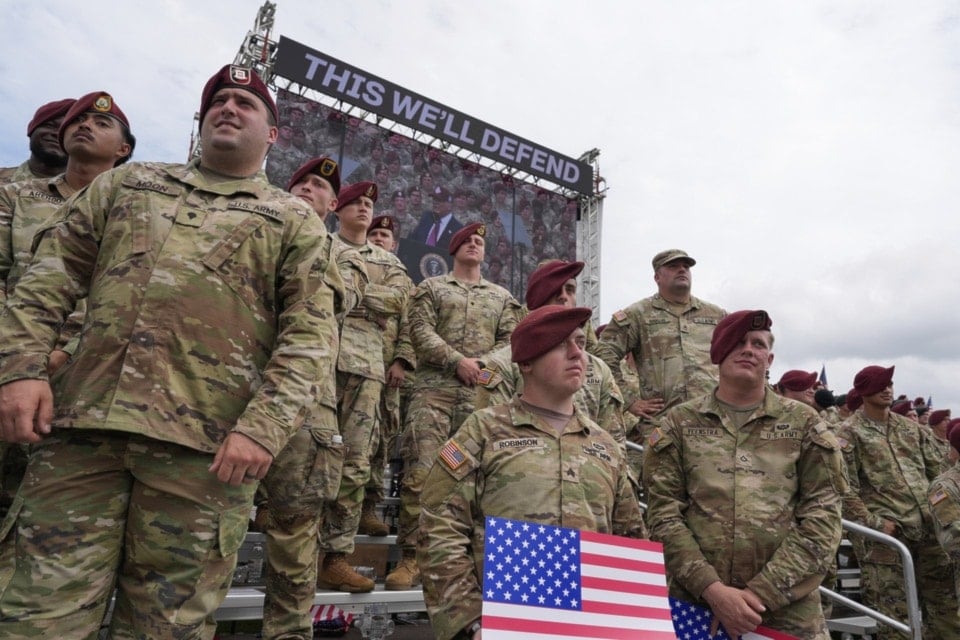Trump moves to reinstate confederate-linked army base names amid purge
The US President's plan of reversing Biden-era Army base re-namings has drawn criticism for circumventing federal law and reigniting political tensions over DEI policies.
-

Soldiers listen as President Donald Trump speaks at Fort Bragg on June 10, 2025, in North Carolina (Alex Brandon/AP)
Just days ahead of a multimillion-dollar Army parade in Washington, US President Donald Trump announced plans to restore the original names of seven Army bases that were renamed under the Biden administration as part of an initiative to remove references to Confederate figures.
The controversial decision is part of what many observers see as a larger campaign to roll back diversity, equity, and inclusion (DEI) reforms across the US military.
Speaking to members of the 82nd Airborne Division at Fort Bragg, renamed Fort Liberty last year, Trump stated, “We are also going to be restoring the names to Fort Pickett, Fort Hood, Fort Gordon, Fort Rucker, Fort Polk, Fort A.P. Hill and Fort Robert E. Lee. We won a lot of battles out of those forts, it’s no time to change.”
The Army clarified after Trump’s speech that the names would be restored using a legal workaround: honoring different soldiers who share surnames with Confederate officers, thus technically complying with the federal law prohibiting bases from being named after Confederate figures.
Legal workaround sparks Pentagon confusion
The announcement reportedly caught Pentagon officials off guard. One Army official, speaking anonymously, said the sudden policy shift could take months to implement and that internal briefings had not yet occurred. The Army did not immediately respond to requests for clarification.
The Biden-era changes stemmed from a 2021 law passed in the wake of the George Floyd protests, which directed the Pentagon to rename installations that honored Confederate leaders. That legislation passed with bipartisan support, overriding Trump’s 2020 veto.
Under that law, Fort Hood was renamed Fort Cavazos in honor of Gen. Richard Cavazos, the Army’s first Hispanic four-star general. Fort Bragg became Fort Liberty, commemorating World War II hero Private First Class Roland L. Bragg, while Fort Benning was redesignated Fort Moore, named after Gen. Hal Moore and his wife Julia.
Trump’s decision to reverse the changes was presented as consistent with the law, but critics say it openly defies the reform’s intent.
Critics call move a political stunt to subvert reform
“This is a thinly veiled attempt to subvert the law by finding veterans who just happen to share the same names as Confederate generals,” said a congressional aide involved in the original base-renaming legislation. The aide, who spoke anonymously, accused the Trump administration of exploiting technicalities to circumvent bipartisan consensus.
Ty Seidule, a retired Army brigadier general and former vice chair of the Congressional Naming Commission, condemned the move. “The bottom line is he’s choosing surname over service,” Seidule said. “It is breaking the spirit of a law that was created by the will of the American people.”
The Naming Commission, made up of retired military officers from both parties, spent 20 months reviewing thousands of public submissions and finalized the changes after receiving more than 33,000 responses.
“Confederates chose treason to preserve slavery,” Seidule added. “They are unworthy of having bases named for them in America in 2025.”
Broader pushback on DEI policies across the military
Trump’s announcement is part of a wider reversal of DEI-related reforms. Just days earlier, Defense Secretary Pete Hegseth, appointed by Trump, ordered the renaming of several US Navy vessels.
In his speech at Fort Bragg, Trump also criticized President Biden and California Governor Gavin Newsom, sparking boos from uniformed service members. “Do you think this crowd would have showed up for Biden?” he asked. “I don’t think so.”
Presidents typically avoid partisan remarks in front of active-duty troops. However, Trump used the occasion to attack immigration policies and vowed to "liberate Los Angeles," claiming that parts of the city are under the control of international criminal gangs.
According to Pentagon officials, Trump has already ordered 4,000 California National Guard soldiers and 700 Marines to be deployed near Los Angeles, with 300 Guardsmen having entered the city so far. Marines remain stationed outside, undergoing crowd control training.
Naming controversy renews questions of precedent
Seidule warned that Trump’s move could set a troubling precedent. “What happens if some other administration would name something after someone that one party thinks is just absolutely beyond the pale?” he said. “This could absolutely be a tennis match.”
While the Trump administration insists that the redesignations conform to legal requirements, critics argue that the move undermines bipartisan efforts to create a more inclusive military legacy.
Whether future administrations follow suit or reverse course again may depend on how firmly Congress and the Pentagon defend the principles behind the original reforms.

 5 Min Read
5 Min Read








